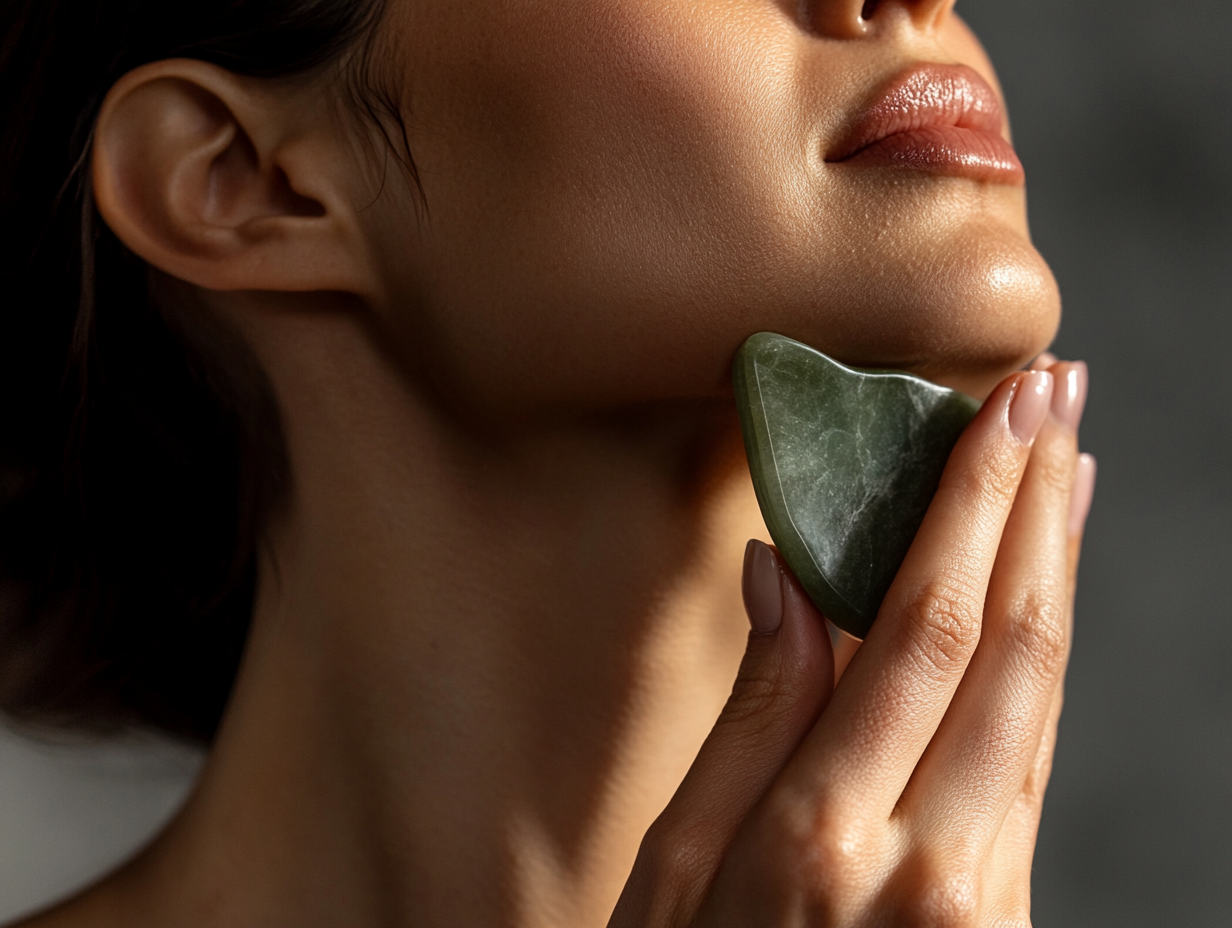Ever stumbled across social media posts raving about the latest "miracle" skincare ingredient – exosomes? You're not alone. Exosomes have become a hot topic, promising to revolutionize how we achieve younger-looking skin. But before you rush out and buy the most expensive exosome serum, let's separate fact from fiction and explore what the science really tells us.
In this post, we'll delve into the fascinating world of exosomes, unpack their potential benefits for skincare, and address the current limitations of this emerging technology. We'll also explore powerful natural alternatives that can help you achieve a radiant complexion without the hype.
So, buckle up, skincare enthusiasts! We're about to embark on a journey to understand the science behind exosomes and empower you to make informed choices about your skincare routine.
Want to receive a bite sized email every Sunday from STUNN’s founder, Ash, diving into a contentious beauty and wellness trend? Subscribe to hear her thoughts on whether men need special skincare, and much more!
What are Exosomes, and How Do They Work?
Imagine tiny mail carriers zipping around inside your body, delivering important messages to your cells. That's essentially what exosomes are! These microscopic spheres are released by our cells and contain precious cargo – proteins, lipids (fats), and genetic material (RNA). They act as messengers, shuttling this information between cells, and influencing their behavior and function.
Here's the exciting part: scientists believe exosomes have the potential to revolutionize various fields, including medicine and, you guessed it, skincare! The idea is that exosomes can be harnessed to deliver specific molecules directly to skin cells, potentially addressing various concerns like wrinkles, hyperpigmentation, and loss of elasticity.
The Potential of Exosomes in Skincare: A Glimpse into the Future?
Early research on exosomes in skincare is promising. Here are some of the potential benefits that have generated so much buzz:
- Boosting Collagen Production: Collagen is the protein that gives our skin its plumpness and youthful appearance. Studies suggest exosomes might stimulate collagen production, leading to firmer, smoother skin.
- Reducing Inflammation: Exosomes have natural anti-inflammatory properties, which could be beneficial for calming conditions like eczema and rosacea.
- Promoting Skin Barrier Repair: A healthy skin barrier protects us from environmental damage. Exosomes might help strengthen this barrier, keeping our skin hydrated and healthy.
- Targeted Delivery: Because exosomes come from our own cells, they're seen as biocompatible, meaning they're less likely to irritate the skin. Additionally, their ability to target specific cell types makes them potentially more effective than traditional skincare ingredients.
Let's Pause and Address the Hype: The Limitations of Exosome Skincare
While the potential of exosomes is exciting, it's important to be realistic. Here are some key points to consider:
- Limited Research: Most studies on exosomes in skincare are still in their early stages. More research is needed to confirm their efficacy and long-term safety in skincare products.
- Cost Factor: Because it's a cutting-edge technology, exosome-based skincare products are likely to be expensive.
- Delivery Concerns: Similar to other topical skincare ingredients, there are questions about how effectively exosomes penetrate the skin.
- Regulation: Currently, there's a lack of regulation surrounding exosome-based skincare products and treatments, making it difficult to assess their quality and safety.
So, should you ditch your current routine in favour of a trending exosome serum?
Probably not just yet. While exosomes hold promise, focusing on established methods with a proven track record is important. Here's the good news: you can achieve radiant skin without the latest fad! Let's explore some powerful natural alternatives in the next section.
Unveiling Natural Powerhouses: Effective Alternatives to Exosome Skincare
Like exosomes, nature has a treasure trove of potent ingredients that can work wonders for your skin. Let's delve into some of these natural powerhouses and discover how they can rival the proposed benefits of exosomes:
1. Harnessing the Potency of Plant Extracts: Nature's Arsenal for Radiant Skin
Plant extracts, concentrated forms of beneficial compounds found in plants, are a cornerstone of natural skincare. These extracts are packed with antioxidants, vitamins, and other potent ingredients that can address various skin concerns. Here are some powerhouse plant extracts that rival the proposed benefits of exosomes:
- White Lupin Extract: This extract, found in Fountain Phyto Retinol, is derived from the white lupin seed, has been shown to stimulate collagen production and improve skin elasticity. Similar to how exosomes might target specific cells, white lupin extract appears to interact with fibroblasts, the skin cells responsible for collagen production. This can lead to firmer, smoother skin, mimicking the potential effects of exosomes.
- Licorice Root Extract: This extract boasts brightening properties, helping to reduce hyperpigmentation and even skin tone. Licorice root extract inhibits the production of tyrosinase, an enzyme involved in melanin synthesis. This aligns with the proposed function of exosomes in addressing hyperpigmentation, you can find this ingredient in Gloss Clarifying Serum.
- Green Tea Extract: This extract is rich in antioxidants and has anti-inflammatory properties. Green tea extract can calm irritation, reduce redness, and protect the skin from free radical damage. Like exosomes, green tea extract offers a multi-pronged approach to promoting healthy skin.
By incorporating these powerful plant extracts into your skincare routine, you can harness the natural power of botanicals to achieve a radiant, youthful complexion.
2. Achieving Glowing Skin with Nutrient-Rich Botanical Oils:
Our skin thrives on nourishment. Plant-based oils like jojoba oil, rosehip oil, and argan oil are packed with essential fatty acids and vitamins that nourish and hydrate the skin [^9]. These oils can help improve skin elasticity, reduce dryness, and promote a healthy, radiant complexion:
- Jojoba Oil: Jojoba is a wax ester (an oil-like substance) that is similar to the natural sebum produced by our skin, making it readily absorbed and non-comedogenic (doesn't clog pores). This ingredient is excellent for all skin types, providing deep hydration and a healthy glow and can be found in Revival Barrier Repair Face Oil and Dew Brightening Face Oil. Check out our article on the benefits of Jojoba oil for a more detailed introduction into this amazing ingredient.
- Rosehip Oil: Rich in vitamins A and C, rosehip oil has anti-inflammatory properties and promotes skin cell regeneration. This oil, which you can find in both Fountain Phyto Retinol Serum and Dew Brightening Face Oil, can help reduce hyperpigmentation, scars, and fine lines, leaving your skin looking smoother and brighter. Check out our guide on Rosehip oil and explore the whether rosehip oil is safe for pregnancy (TL;DR, it is!).
- Argan Oil: This oil is packed with antioxidants and vitamin E, offering intense hydration and protecting against free radical damage. Argan oil, which can be found in Gloss Clarifying Serum, is particularly beneficial for dry and mature skin, improving elasticity and reducing wrinkles.
3. Embracing Microbiome-Friendly Skincare for Optimal Skin Health:
The skin microbiome, a complex ecosystem of bacteria, plays a crucial role in maintaining skin health. While prebiotics and probiotics can be beneficial for some, focusing on a microbiome-friendly approach offers broader applicability. Here are some tips to cultivate a healthy skin microbiome:
- Gentle Cleansing: Harsh cleansers can disrupt the delicate balance of the microbiome. Opt for gentle, yet effective oil cleansers that remove dirt and impurities without stripping away natural oils, like Halo Brightening Oil Cleanser or Prism Restorative Oil Cleanser.
- Nourishing Moisturizers: A healthy skin barrier is essential for a balanced microbiome. Look for moisturizers or face oils like Revival Barrier Repair Face oil, rich in ceramides and prebiotics to strengthen the barrier and promote the growth of beneficial bacteria.
- Limit Exfoliation: Over-exfoliation can disrupt the microbiome. Aim for exfoliation 1-2 times per week, depending on your skin type, using gentle exfoliating products.
By embracing a microbiome-friendly skincare routine, you create an environment where good bacteria can flourish, contributing to healthy, resilient skin. This approach complements the proposed benefits of exosomes, which might indirectly support the skin microbiome.
Remember, consistency is key when it comes to microbiome-friendly skincare. By following these tips and adopting a gentle approach, you can nurture a thriving skin microbiome for long-term health and radiance.
The Final Verdict: A Balanced Approach for Glowing Skin
Exosomes offer a glimpse into the future of skincare. However, for now, focusing on established methods and natural ingredients might be a wiser choice. By incorporating powerful plant extracts, and botanical oils, and embracing a microbiome-friendly approach, you can achieve a healthy, radiant complexion with minimal environmental impact.
Remember, consistency is key! Sticking to a well-rounded skincare routine with natural ingredients and prioritizing a holistic approach (healthy diet, quality sleep, stress management) is the best way to achieve long-term results.
We hope this blog post empowers you to make informed decisions about your skincare journey. Embrace the power of nature, personalize your routine, and prioritize sustainability. Your beautiful skin will thank you for it!
FAQ’s
-
What are exosomes and how do they relate to skincare?
Exosomes are microscopic spheres released by our cells that carry messages between them. Early research suggests they might have the potential to address skin concerns like wrinkles and hyperpigmentation. However, more research is needed to confirm their efficacy and safety in skincare products.
-
Are exosome-based skincare products worth the hype?
Exosome skincare is a promising new technology, but it's still in its early stages. These products can be expensive, and their effectiveness and long-term safety haven't been fully established.
-
What are some natural alternatives to exosome skincare?
Nature offers a wealth of potent ingredients for radiant skin. Plant extracts like white lupin extract and licorice root extract can stimulate collagen production and reduce hyperpigmentation. Botanical oils like jojoba oil and rosehip oil nourish and hydrate the skin.
-
How can I create a microbiome-friendly skincare routine?
Focus on gentle cleansing, nourishing moisturizers with ceramides and prebiotics, and limit exfoliation. This creates an environment where beneficial bacteria can thrive, contributing to healthy skin.
-
What's the best approach to achieve glowing skin?
Combine natural ingredients like plant extracts and botanical oils with a microbiome-friendly routine. Prioritize a healthy diet, quality sleep, and stress management for a holistic approach to radiant skin.




